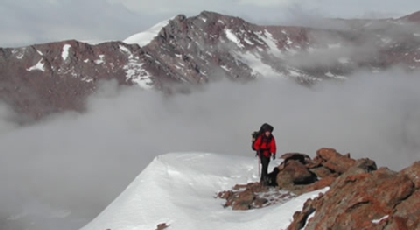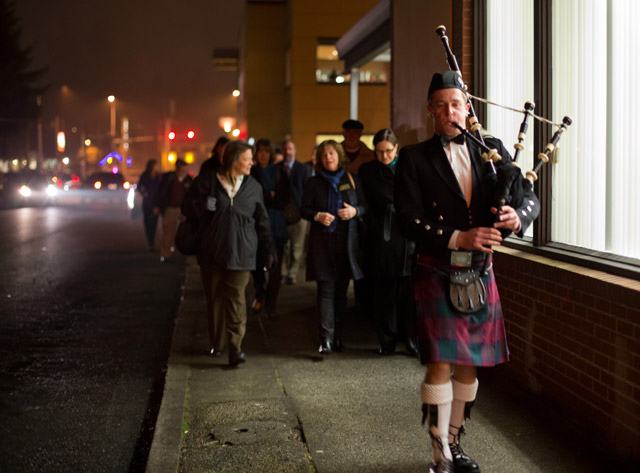Page 52 • (594 results in 0.039 seconds)
-
During J-Term 2021, students in Assistant Professor Kate Drazner Hoyt’s Media Literacy COMA 388 explored topics such as: – the role that the press plays in sustaining democracies; – the different forms of online misinformation and disinformation; – the rise of conspiracy theories on web…
; – and what to look for to ensure the credibility of online information. The class culminated in a final “Critical Making” project, where students built, designed, or mocked up a media literacy tool. The goal of the assignment was to envision a web that prioritized the circulation of credible information. Critical making is a process where students apply theories and concepts to a creative project or artifact, and where imaginative design – focusing more on engagement with theory and concepts, rather
-

I am proud to be a first-generation college graduate, or what Pacific Lutheran University calls “first in the family” — someone whose parents didn’t graduate from four-year, degree-granting institutions in the U.S. Navigating college can be difficult for any student, but it’s particularly challenging when…
what I’m most passionate about, which is writing, journalism, politics and social justice.” 3. A family-college balance. Leaving home does not mean leaving your family. Still, it can sometimes be hard to explain to them that you can’t come home because you’re stressed about a paper due on Monday. Balancing the two worlds looks different for everyone, but it gets easier to manage over time. “Often with first-generation students, there is a pressure to do majors that have a more direct career path
-

TACOMA, WASH. (Jan. 10, 2019) — For student-athletes, loaded down with team meetings, practices and weight room, transitioning from high school classes to collegiate course loads can be challenging. But PLU football coach Brant McAdams believes it doesn’t have to be that way. That’s why…
courses can have on the academic accomplishments of first-year student-athletes when he was coaching at Trinity University. “All the first-years came in together, got to know each other, but then got to dig into the transitions of the writing skills, research resources, time management,” he said. “The changes we saw were an increase in freshman GPA and then over the course of four years we saw an increase in team GPA.” When McAdams discovered that his new job had a similar program, he was ready to get
-

In the spring of 2021, Kenzie Knapp ’23 was awarded a Udall Foundation scholarship. The Udall Foundation awards scholarships, fellowships, and internships to students pursuing fields of study related to the environment or Native American nations. Knapp has served as a G.R.E.A.N. club officer, is…
to do my best to prevent that. There are a couple of legislations for student government that I am super excited to keep writing. I would love to work on providing more widespread free public transit by using student government funds. I know my experience as a freshman who didn’t have a car and Tacoma is a 30-minute bus ride away and it’s $2 one way like it really adds up for students and it takes time. I hope to make that more accessible for everyone so we can explore Tacoma more. I would also
-

Nayonni “Nai Nai” Watts has autism, and she’s not afraid to be open and honest about it. “If people want to learn about autism, it’s best to learn from an autistic person rather than a non-autistic person,” she says. In January Watts debuted her student-led…
eventually get into “The Miraculous Ladybug”: “Any show that has any kind of diversity that kids can pick up is just really fun to watch.” Watts gravitated towards cartoons because she particularly enjoys writing scripts for animated kids stories. “I aspire to be a writer,” she said. “It’s where my passion lies.” “Spectrums of Color” tells a cohesive story using those separate vignettes — “Autistic Alliance,” which aims to spread awareness of autism and showcase women of color on the high and low sides
-

We’re in a brave new world of all-online scholarship application and adjudication process. Students entering PLU in fall 2021 as a first-year or transfer student with an interest in any of our varied Art & Design concentrations can still apply for an Artistic Achievement Award.…
different ways, depending on your preference. It could be the same as a resume you would use to apply for a job but lists artistic classes, volunteer work, or anything else in the arts you’d want us to know about. If you’ve taken many kinds of art classes, or want to include other related disciplines (like writing, theatre, dance, etc.) you can send us a resume that is more focused on what you’ve learned, who your teachers were, and where you’ve taken classes. Don’t stress about the resume too much, as
-

Scholarship applications have opened and we are now accepting applications for the 2023-24 school year. Incoming students (new or transfer) are eligible to apply for these renewable, merit-based awards. Read below for tips and tricks for preparing your best application! How do I apply? Apply…
you’d want us to know about. If you’ve taken many kinds of art classes, or want to include other related disciplines (like writing, theatre, dance, etc.) you can send us a resume that is more focused on what you’ve learned, who your teachers were, and where you’ve taken classes. Don’t stress about the resume too much, as we’re mostly interested in learning about what you’ve done outside of regular schoolwork. At PLU we understand you may be at the beginning of your artistic journey, so your artist’s
-

PLU student and prof head to Antarctica for global warming research through study of rocks and ice By Barbara Clements In a lab littered with Hostess snack bars and French fry wrappers, geosciences student Mike Vermeulen ’12, turns to his computer and pops up a…
schools and Seabury School via Skype. The pair will also be writing a blog about their research during their trip. After more than a month on the ice, the team will head back to McMurdo in mid-January, and finally return to PLU in early February. Next year at this time, Todd plans to head out on another expedition to Antarctica with another lucky student. And for Todd, yet another Christmas, in a tent, out on the ice. But she wouldn’t have it any other way. University Communications Intern and
-

Sam Horn ’15, leads a traditional march for a Robbie Burns themed night at the Garfield Book Company. (Photo by John Froschauer) These pipes are playing By James Olson ’14 I exchanged a firm handshake with Samuel Horn ’15 outside the North Pacific Coffee Company…
become one of the best in the world.” To do so, Horn explains, “The bagpipes have to be your entire life.” For him, this is a commitment he is not willing to make. Hoping to pursue a future somewhere where sports and writing converge, he feels he is being drawn elsewhere. But he remembers his past with the instrument fondly. “When I first got to join a bagpipe band the feeling of all playing together felt awesome,” he says, of the experience playing in unison with the other bagpipers in his band
-
OLYMPIA, Wash. (March 4, 2015)— The first round of policy and fiscal committee cut-off dates has come and gone. This week, members of the Senate and House will spend much of their days alternating between passionate, public floor debates and quiet, closed-door caucus meetings. The…
legislative ethics, writing and research, a budget exercise, mock committee hearings and floor debate, and a job shadow at a state agency. Interns also participate in seminars and workshops with state officials, policymakers, journalists and lobbyists, offering networking opportunities and a global view of the political process. Washington Legislative Internship Homepage Read Previous International Star Imparts Wisdom to Operatic Lutes Read Next The Women’s Center at 25: Stories of Inspiration and Impact
Do you have any feedback for us? If so, feel free to use our Feedback Form.


